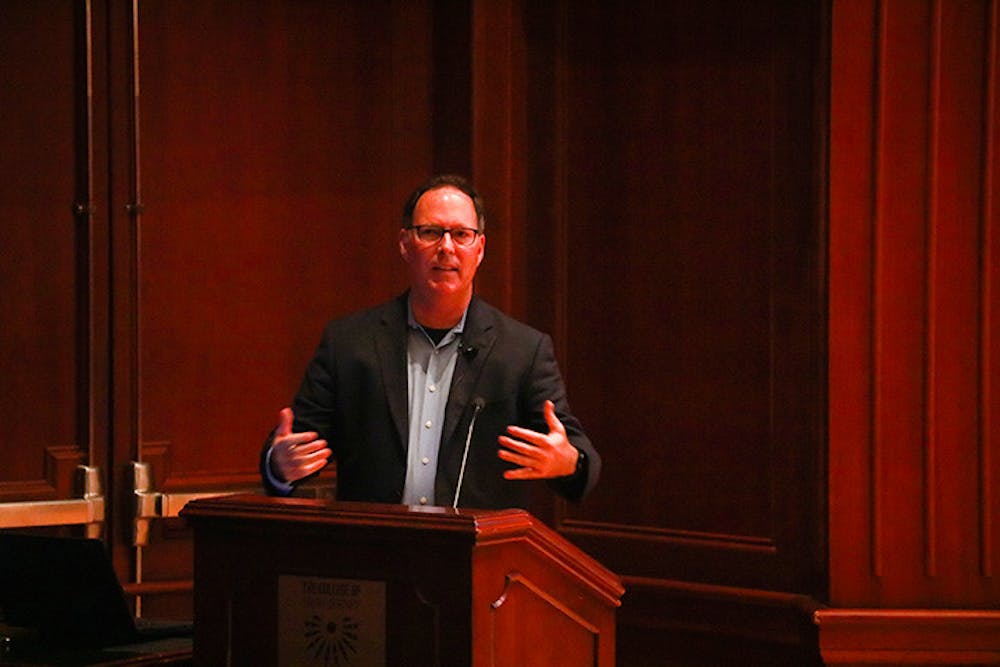By Viktoria Ristanovic
Correspondent
Todd Hobbs, vice president and chief medical officer for Novo Nordisk in North America, came to the College to give a lecture about the American obesity epidemic on Thursday, Sept. 21, in Mayo Concert Hall.
Novo Nordisk is a global healthcare company that works primarily with people that have serious chronic diseases and conditions, including obesity.
Jeffrey M. Osborn, dean of the School of Science, introduced Hobbs with a warm welcome and a brief introduction about his background in medicine and his interests in diabetes and obesity.
Osborn informed the audience that Hobbs was diagnosed with Type 1 diabetes over 25 years ago.
“His passion for defeating the disease intensified even more with the diagnosis of one of his sons with the same condition at the age of five,” Osborn said.
Osborn also mentioned the Novo Nordisk Student scholarships.
Novo Nordisk will support “four student scholarships in the amount of $2,500 each for the 2017-18 academic year for students who have attended at least two of the TCNJ-Novo Nordisk lectures this year and have been deeply engaged in TCNJ’s signature experiences,” Osborn said.
Once a symbol of wealth and prosperity, obesity is now a symbol of poor health. Hobbs commenced the lecture with some stunning statistics about obesity.
“Worldwide obesity has more than doubled since 1980. In 2014, more than 1.9 billion adults, 18 years and older, were overweight,” Hobbs said. “41 million children under the age of 5 were overweight or obese in 2014.”
Obesity is rising in young children because of fast food diets and sedentary lifestyles due to technology like tablets and smartphones, which discourage children from being active.
“The biggest impact is younger kids,” Hobbs said. “We need to help kids learn about food choices and activity.”
Hobbs shared his shocking findings after years of research with the audience.
“By 2030, 40-51 percent of the U.S. population is estimated to have issues with obesity,” he said.
Christina Boras, a senior biology major, agreed with Hobbs on the alarming prevalence of obesity.
“I know many people are obese in my life. It’s definitely a real problem everywhere you look,” Boras said.
Hobbs went into depth about body mass index, and how there are three classes of obesity once a person has a BMI greater than or equal to 30: class one (low risk) at a BMI between 30.0 and 34.9, class two (moderate risk) at a BMI between 35.0 and 39.9 and class three (high risk) at a BMI greater than or equal to 40.
Hobbs also explained how obesity affects females more often than males, and obese women have a greater risk for getting breast cancer than healthy women.
Despite well-known benefits of maintaining a healthy weight and active lifestyle, many Americans eat large portion sizes and aren’t as active as they should be.
Our society has an idea of what a healthy individual should look like — lean and strong. Hobbs knocked these expectations down by giving an example of a controversial magazine cover of a seemingly overweight female runner on it.
“You can’t tell if someone who may look overweight to you, is unhealthy or not. They may be in even better condition than someone who looks thinner and leaner than them,” Hobbs said.
Hobbs also advised staying away from over the counter diet pills.
“Over the counter weight loss medications not good for your blood pressure. There’s not one that will be beneficial to you,” he said. “Diet is about balance. It’s about knowing where your calories are coming from.”
Hobbs advised people who want to lose weight to do so in small increments, since people tend to give up on drastic changes in diet and lifestyle, and then weight is easily gained back.
“Adipose tissue wants to go back to where it was”, Hobbs explained.
Hobbs concluded the lecture by spreading an urgent message to young potential healthcare providers.
“There is a shortage in health care providers given the growing demand for care,” he said.
Saif Hasan, a senior health and exercise science and public health double major, gave his input after sharing that he’s passionate about the obesity epidemic.
“Half the time, it’s because it’s personal. It affected me throughout my life and out of that grew my interest in healthy living. I can empathize with people who are struggling with it,” Hasan said.
Hobbs actively continues his research on obesity and diabetes. With his help, Novo Nordisk is discovering newer therapies to maintain a patient’s weight and try to lower it with treatments for diabetes.
With time, Hobbs hopes that awareness of the obesity epidemic will prevent people from becoming overweight and falling into the unnerving statistics.







